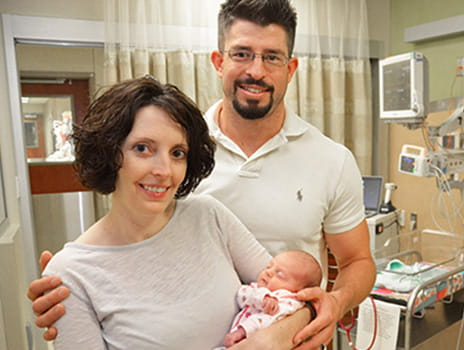A Story of Survival


November 07, 2018
At their 20-week ultrasound, Melissa and Trae Rickford of Lawrence, Kansas, learned that they were having identical twin girls. The news didn't come as a complete surprise – Melissa had grown larger and more quickly than her first pregnancy, and she has a family history of twins. But the ultrasound did show something unexpected: one of the babies was much bigger than the other and had substantially more amniotic fluid.
Melissa and Trae were immediately referred to a perinatal specialist in Kansas City. Melissa received a follow-up ultrasound 2 days later and learned there were complications, but the details about what was wrong were fuzzy.
"Nobody would really tell us what was happening," Melissa says.
Melissa and Trae were referred to a maternal fetal-medicine specialist at The University of Kansas Health System in Kansas City. There, they received a heart-breaking prenatal diagnosis of twin-to-twin transfusion syndrome, or TTTS.
TTTS is a serious disorder that occurs in about 10-15% of monochorionic, identical twin pregnancies. Monochorionic twins share the same placenta, which connects the babies' blood supply through shared blood vessels. If the blood flow becomes unequal, one twin receives the majority of nutrients and grows more rapidly than the other. This can result in a number of complications and often leads to the loss of one or both babies.
Never in my wildest dreams did I think we would have to go through all this. But now we have this amazing baby. – Melissa Rickford
Melissa needed high-level care immediately in order to give her twins the best chance of survival. The smaller (donor) baby had become anemic because she was pumping more blood to the larger (recipient) twin. Also, because of the imbalance in blood flow, both babies’ hearts were working harder and had become damaged, causing heart failure.
Melissa and Trae's specialists discussed the treatment options and risks and recommended a minimally invasive procedure called fetoscopic laser photocoagulation. The surgery uses laser energy to separate the blood vessels and stop blood sharing, allowing the twins to develop independently. The couple went home that night and were scheduled the next morning for surgery.
"We were going to do whatever we needed to do for these babies," Melissa says.
Both babies made it through the surgery successfully, and Melissa and Trae came to the hospital daily for ultrasounds to monitor the twins’ condition. Unfortunately, the donor baby was still severely anemic and not doing well. The doctor recommended an in-utero blood transfusion.
"I was awake for that procedure. It was all done through the belly with needles," Melissa recalls. "I wasn’t cut open, but it was stressful and scary."
The blood transfusion was successful and Melissa and Trae returned to the hospital the next day for a follow-up ultrasound. That's when they learned that their donor baby, whom they named Camille Louise, no longer had a heartbeat. Melissa was only 21 weeks along.
For the health and safety of her surviving twin, Melissa would need to carry both twins for the duration of her pregnancy. But within days of hearing the tragic news, her water broke. She was transported to The University of Kansas Health System, where she remained on restricted bedrest for 13 weeks.

Our maternal fetal medicine specialists provide advanced fetal care, including comprehensive diagnostic testing to identify developmental issues early in pregnancy. Early detection of abnormalities can provide the opportunity for treatment before and after birth.
On September 10, 2016, at 34 weeks' gestation, Melissa gave birth to Juliette Andara Rickford. Juliette was delivered first, and Camille second. Faced with the difficult decision of whether or not to see Camille, Melissa and Trae chose not to.
"Trae and I know where baby Camille is. That's just her body," Melissa says. "We also knew that because she had passed so long ago, she would not look the same. It would have been harder for me to see her."
Melissa and Trae received photos of Camille, as well as her handprint and footprint. Although still grieving, Melissa was comforted by the care she received from her physicians, nurses and staff. "Everyone was amazing, phenomenal," Melissa says. "The nursing staff on the mother-baby unit was fantastic."
Surviving babies of TTTS are often at risk for neurological and cardiac problems after birth. Juliette was fortunate to be born without brain injury, but an echocardiogram showed tricuspid regurgitation in her heart – a disorder in which blood leaks backwards through the tricuspid valve each time the heart beats. While the condition does not usually require treatment, it does require monitoring. Juliette remained in the neonatal intensive care unit for several weeks.
Melissa and Trae made daily visits to see their new daughter in the NICU. Then, on October 4, Juliette was released to go home. It would be the first time the family had been together in 18 weeks.
"Never in my wildest dreams did I think we would have to go through all this," Melissa says. "But now we have this amazing baby."
Like many moms who have lost a child, Melissa admits that she often finds herself wondering if she could have done anything to help baby Camille. But her physician emphasized that high-risk pregnancy can happen to anyone – even those who have had multiple successful pregnancies and who have no family history of complications.
To minimize risk, it's important to plan your pregnancy, maintain a healthy lifestyle and receive timely prenatal care. In fact, if Melissa hadn't had her 20-week ultrasound when she did, if it had been scheduled just one week later, she would have lost both babies.
"She truly is our miracle baby."

We offer a variety of appointment types. Learn more or call 913-588-1227 to schedule now.